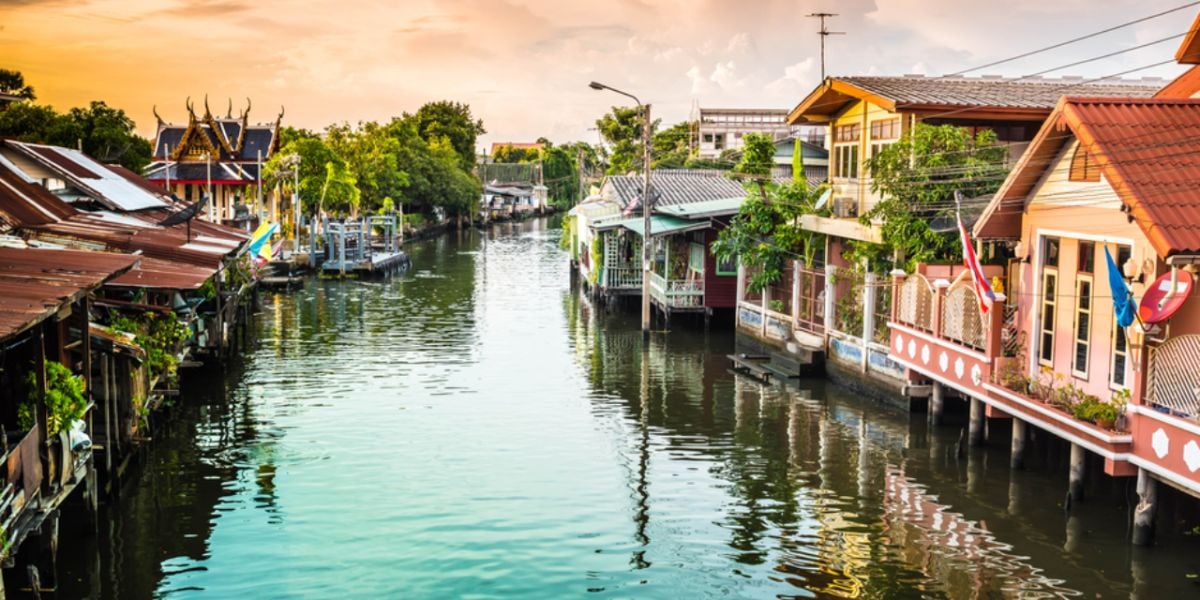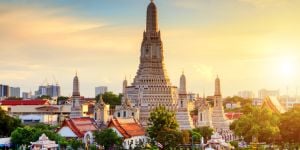
Bangkok is Thailand's capital and largest city. It's where you will have access to the most opportunities, the best nightlife and restaurants, huge modern shopping malls, Thailand's famous SkyTrain, and more.
Bangkok offers a wide variety of accommodations, so you are likely to find something that meets your preferences and budget. From a serviced apartment to a townhouse in the center, there is something for everyone in this city that never sleeps — although prices do vary according to the neighborhood and level of luxury.
Nearly half of the expatriates living in Bangkok choose to live in the central business district (CBD) of Sukhumvit. However, housing prices in other areas of the city are considerably lower, and the other half of the expatriate community is spread out around Bangkok's suburbs, where there are more options and space available.
When looking to rent accommodation in Bangkok, it is advisable to consider your daily needs and consider factors such as work and school. In Bangkok, as a result of heavy congestion, traveling even short distances by car can take a long time, so it is advisable to look for accommodation near public transport or your workplace. Moreover, the further you live from the main road and the BTS station, the cheaper the accommodation options available, so it is a question of weighing up your priorities.
Buy or rent in Bangkok?
A lot of expats who live in Bangkok, even for a long time, still opt for long-term rent. Buying property in Bangkok is quite complicated for a foreigner and comes with a lot of restrictions.
Foreigners are not allowed to own land outright in Thailand. However, Thai law allows foreigners to buy a condominium so long as they show that the money came from outside of Thailand. Also, foreigners can only own 49% of all condo units in a building. For example, if a condo building has 100 units and 49 of them are already owned by foreigners, the building cannot sell any more units to foreigners.
As a result of these restrictions, many foreigners prefer to secure a long-term lease agreement. The law allows leases of up to 30 years, but if you sign a 30-year lease, make sure it is registered so that you will have recourse if your landlord tries to evict you prior to that time.
Important:
If you decide to purchase real estate in Thailand, it's essential that you consult with a lawyer and a real estate agent before making any final decisions.
Good to know:
Leases are only valid for 3 years if they are not registered at the Land Department.
Many leases contain renewal clauses that provide for a renewed 30-year lease once the initial 30-year period comes to an end. A renewal clause is a promise to renew a lease. Still, it is important to understand that it does not always mean an automatic renewal, as your landlord's cooperation is tantamount.
Notifying Thai immigration
When you rent a condo or house in Bangkok, you must notify Thai immigration within 24 hours of moving into the residence. If you don't, you will be fined up to THB 2,000. Although this is the landlord's responsibility, most of the time, they will never do it. So this falls on you to take care of.
You have to go to the nearest Thai immigration office and fill out form TM30. Be sure to bring:
- your passport;
- a signed copy of your lease (all parties sign);
- a signed copy of the landlord's ID card, front and back (landlord signs);
- a signed copy of the owner's property title/deed (landlord signs).
Once complete, Thai immigration officials will give you the bottom half (receipt) of the TM30 form. You should make plenty of copies of the TM30 receipt and keep the original in a safe place. You will need the receipt for many other procedures in Thailand, such as applying for a long-term visa or residence certificate to open a bank account or buy a car.
Types of accommodation in Bangkok
With that said, let's look at the different kinds of accommodations available to foreigners in Bangkok.
Serviced apartments
Serviced apartments do vary in Bangkok, depending on the location and the price. Most are nicely furnished and offer regular cleaning, but do not expect it in all serviced apartments in Bangkok. Most of the expatriates live in the CBD, which is the Sukhumvit area, where the most well-established and well-known companies are situated, so expect that the prices will be high in these areas.
Serviced apartments have the simplest furniture, everything you can see in a typical house: bed, wardrobe or closet, table, and aircon or electric fan. The bathroom contains a sink and a shower, but not all of them have an electric water heater. Rent prices range from 10,000 to 25,000 THB per month.
Townhouses
Townhouses in Bangkok are composed of multiple floors and are mostly adjacent to other townhouses that can be seen in a row. Some are renting it to have the lower ground for business purposes and the upper floor for personal use. Basically, townhouses are like multi-level apartments. Rent prices range from 12,000 to 25,000 THB per month or more than that, depending on the size and location of the townhouse.
Condominiums
Condominiums in Thailand are very common and can be seen almost everywhere. Most expatriates in Bangkok prefer it as they feel more secure there. Compared to serviced apartments and townhouses, condominiums have lots of services and amenities such as a swimming pool, gym, playground for kids, 24-hour security, parking space, cable for television and internet, and maintenance. Keep in mind, though, that many condos only come with one parking space. If you need more than that, you'll have to pay for the extra spot on a yearly basis. This could cost you an extra THB 10,000 per year.
If you have the budget, a luxury condominium is a very chic way to appreciate the bright lights of Bangkok from a home up high. Rent prices range from 8,000 to 50,000 THB per month or more than that, depending on the size and location of the condominium.
Moo ban
It is also known as a housing estate or village. Moo bans are a housing community that comes in different sizes, shapes, prices, and characteristics. Some have amenities that include swimming pools, tennis and basketball courts, parks, gym or fitness centers, and restaurants.
The cost of renting a moo ban in Bangkok can vary a lot depending on the age, location, and quality of the build. Most are also located outside the city center, so it is likely advisable for people who have decided to live in a moo ban to have a car as well, or maybe be ready to commute. If you have a family and pets, then renting a house in a secure gated community could be a great option. Rent prices range from THB 10,000 to 100,000 per month, depending on the location and how old the moo ban is.
It's also worth noting that the landlord may or may not pay the moo ban maintenance fees. If they choose not to, this could fall on you, the renter. This might mean you pay an extra THB 2,000 per month on top of the rent.
Searching for accommodation in Bangkok
There are several websites that allow you to browse by price or area, which makes it convenient to do research and see what is out there. However, not all accommodations – especially the cheapest options – are listed on websites, so one of the best ways to search for accommodation in Bangkok is by physically walking around an area of town where you would like to live and visiting apartment blocks that look suitable or houses that have "For Rent" and signs outside.
If you want to look online, some of the best websites are:
All apartments in Bangkok have an information office on the ground floor that is usually open during working hours. So, if you are interested in renting in a particular apartment building, someone will usually be happy to show you a room and let you know the requirements. If you don't speak Thai, it is a good idea to go with a Thai friend who can translate and negotiate for you.
Also, don't forget to prepare a certain amount as almost all are requesting an initial payment of 2 months' advance and one month's deposit just in case you will just leave without telling them, or maybe some furniture was broken after staying. They will deduct the expenses you have incurred and will give back the deposit amount after the contract has ended.
It is also worth looking at the classified sections of local English newspapers such as The Nation and The Bangkok Post. If you have a higher budget and particular specifications, then it is a good idea to contact a real estate agent who will know the ins and outs of the city and various properties and will be able to find you accommodation that suits your needs and budget. Plus, expat forums can also be a good place to start when searching for accommodation or getting some advice from more experienced Bangkokians on where to rent in the city. Check out Bangkok Expats, Expats in Bangkok, Thailand Expats, and others.
The best neighborhoods for expats in Bangkok
Finding the best neighborhood for expats in Bangkok is almost impossible, not because there are no such neighborhoods. On the contrary, there are too many, and they are too different. So, your choice of neighborhood will depend on what you are looking for in this big, exciting city.
Here are a few options:
Thonglor
Thonglor is a hip and upscale neighborhood frequented by Thai high society. Debatably, this is the city's trendiest neighborhood — with the prices to match. Prices here start at about THB 45,000 per month.
However, you will be paying for convenience. In Thonglor, you are always working within walking distance of upscale dining spots, designer boutiques, cool bars, modern malls, and more. So, if you are looking to be in the midst of high-end action, Thonglor may just win you over.
Ekkamai
If you prefer a more middle-class setting, then you might feel more at home in Ekkamai. This neighborhood has more of a hipster vibe and lots of restaurants, cafes, and bars to choose from.
Ekkamai is right in the Sukhumvit area, which makes it easily accessible by the BTS SkyTrain. Additionally, there is also the Eastern Bus Terminal.
Ekkamai is both trendy and traditional — and there are lots of housing options to choose from. Living here is easy, interesting, and a reasonable amount of fun.
Phrom Phong
Phrom Phong is another neighborhood on our list that is sitting on the BTS Sukhumvit line. It has a nice selection of cafes, art galleries, grocery shops, and a park. Here, you will find a lot of stores selling Korean and Japanese products, as this neighborhood is very popular with expats from these countries.
Sathorn
Sathorn is in central Bangkok and one of the most expensive areas in which to stay. There are lots of luxury accommodation options as well as gated communities with gyms and swimming pools.
There are lots of things to do in Sathorn, and you will have easy access to lots of modern dining, eventful nightlife, and easy shopping. The neighborhood is close to the BTS, which makes commuting a breeze.
Lat Phrao
Lat Phrao is a great option for expats with families. This area is home to some of the best international schools in the city and has lots of parks and open areas.
Traveling to and from this neighborhood is easy and convenient. It's close to both the BTS and MRT, as well as the Northern Bus Terminal.
Rent here is very affordable, too, starting at THB 10,000 per month.
Ari
If you are looking to get away from the busy Bangkok, consider Ari. This neighborhood is not centrally located, which may be an inconvenience for some. However, if you want to stay somewhere quieter, slower, and more laid-back than Bangkok's constant race, this may be the place for you.
Ari is a safe and clean area with a lot of cafes, restaurants, and bars. Rent here starts at about THB 16,000 per month.
Bang Na
Another neighborhood a bit further away from the center is Bang Na. It's an up-and-coming neighborhood with lots of different accommodation options for every budget. It's also a good place to be if you want to get away from the skyscrapers and prefer a more low-rise scenery. Rent prices here start at THB 10,000 a month.
Udom Suk
Udom Suk is part of Bangkok's CBD. It may have fewer expat-oriented restaurants and bars, but this may also be a good thing for those who want to experience the real Thailand. Here, you will find lots of smaller budget-friendly Thai restaurants, which will be great finds for those who prefer authentic local flavors. Here, you will also find lots of reasonably priced massage places, shops, and other amenities. The Bangkok International Trade and Exhibition Center (BITEC) is also located close by.
On Nut
On Nut has lots to offer, from reasonable rent to easy access to Bangkok's center. More and more expats are moving to On Nut — even though the area was originally home to mostly Thai nationals.
Living here is convenient, with a good number of supermarkets, shops, cafes and restaurants. There are also quite a few coworking spaces, which makes this area a good choice for digital nomads.
Phra Khanong
Phra Khanong is a convenient neighborhood along the BTS Sukhumvit line. Here, you will find more affordable accommodation and actual houses to rent instead of condos or apartments. This neighborhood is primarily Thai, but there are expats living here too. Those who move here like Phra Khanong for its proximity to Bangkok's commercial areas and the area's quieter, more small-town feel.
By far, this is not an exhaustive list of Bangkok neighborhoods to consider, but this may be a good base to get you started as you explore the city on your own.
How to rent accommodation in Bangkok
To rent accommodation in Bangkok and generally in Thailand, you will usually need to provide a copy of your passport and sometimes, but not always, a copy of your work permit and proof of income.
Most rental agreements are signed for 6 months to 1 year. However, the duration of the lease and the rental price are negotiable with the owner, but they can never be less than 6 months.
Generally, a lease and security deposit are all that is needed to secure property in Thailand. In most cases, you can expect to pay a two-month deposit along with the first month's rent. At the end of the lease, the deposit may be returned as long as the property and furnishings are in good condition. If you leave before the end date of your lease agreement, you could forfeit your deposit unless specified in the contract. Make sure to carefully check the property before signing the lease and take note of any existing damage. It's also standard practice to take inventory of all the furnishings and appliances that the property comes with.
Take note that foreigners are not allowed to use their rented accommodation for commercial purposes and are not allowed to sublease either, as it is a violation of Thai law (Condo Act Sec 17.1 as follows):
"In the case where a space in the condominium is set aside as a place to carry out the business, the system on entering and exiting such an area shall be specifically set up in order to prevent the disturbance of the peaceful enjoyment of the joint owners.
No person shall be permitted to engage in any trade transactions in the condominium except it is a trade transaction in the area of the condominium designated in accordance with paragraph one) that disallows condominiums and apartments for short-term renting".
Useful links:
We do our best to provide accurate and up to date information. However, if you have noticed any inaccuracies in this article, please let us know in the comments section below.








